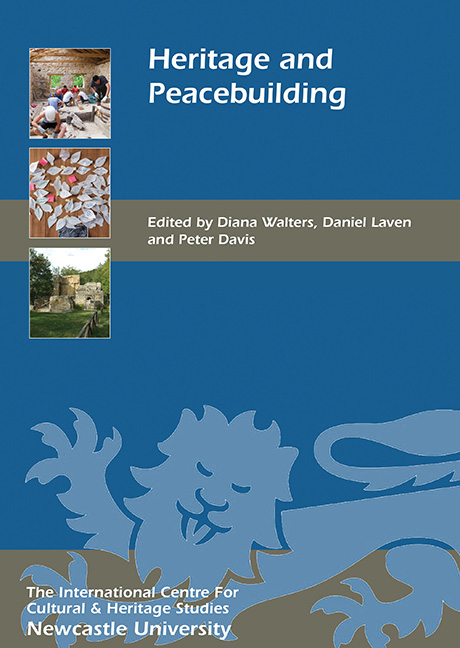Book contents
- Frontmatter
- Contents
- List of illustrations
- Acknowledgements
- List of abbreviations
- Preface
- Introduction
- NEW AND EMERGING IDEAS AROUND HERITAGE AND PEACE
- 1 The Heritage of Peace: the Importance of Peace Museums for the Development of a Culture of Peace
- 2 A Conversation with Seth Frankel: Designing Exhibitions for Peace
- 3 Public Spaces for Strangers: the Foundation for Peacebuilding and Implications for Heritage Institutions
- 4 Can Museums Build Peace? The Role of Museums in Peacebuilding and Internationalism
- 5 Information and Communication Technologies for Heritage and Peacebuilding
- 6 A Conversation with David Fleming: the Role of National Museums Liverpool in Social Justice and Peacebuilding
- HERITAGE AND PEACEBUILDING IN PRACTICE
- HERITAGE, PEACEBUILDING AND SITES
- List of Contributors
- Index
- Previous Titles
1 - The Heritage of Peace: the Importance of Peace Museums for the Development of a Culture of Peace
from NEW AND EMERGING IDEAS AROUND HERITAGE AND PEACE
Published online by Cambridge University Press: 16 February 2018
- Frontmatter
- Contents
- List of illustrations
- Acknowledgements
- List of abbreviations
- Preface
- Introduction
- NEW AND EMERGING IDEAS AROUND HERITAGE AND PEACE
- 1 The Heritage of Peace: the Importance of Peace Museums for the Development of a Culture of Peace
- 2 A Conversation with Seth Frankel: Designing Exhibitions for Peace
- 3 Public Spaces for Strangers: the Foundation for Peacebuilding and Implications for Heritage Institutions
- 4 Can Museums Build Peace? The Role of Museums in Peacebuilding and Internationalism
- 5 Information and Communication Technologies for Heritage and Peacebuilding
- 6 A Conversation with David Fleming: the Role of National Museums Liverpool in Social Justice and Peacebuilding
- HERITAGE AND PEACEBUILDING IN PRACTICE
- HERITAGE, PEACEBUILDING AND SITES
- List of Contributors
- Index
- Previous Titles
Summary
When surveying the heritage of war and peace, the observer, at least in the Western world, seems to be confronted by a stark contrast: while war is everywhere, peace is hard to find (Gittings 2012). This was already the finding of Erasmus of Rotterdam 500 years ago. In what can be regarded as the first classic in the literature on peace in modern times – The Complaint of Peace (1517) – he deplored the absence of peace, concord and harmony, and the overwhelming presence of war, violent conflict and bloodshed in the world around him. A devout Christian and humanist, he never ceased to condemn as barbaric, immoral, irrational and un-Christian the practice of war and the profession of the soldier which made it possible. ‘No one thundered more eloquently against the evils of war than did the great Erasmus … perhaps the most famous of the humanists’ (Hirten 1946, VI). Sometimes referred to as the first European, he witnessed war and the aftermath of war during his many travels through devastated villages and countryside, meeting beggars, cripples, orphans and widows whose lives had been destroyed or made much more precarious through war (Vanden Branden 1996, 30). He expressed his anger and fury in many writings, including in his extensive correspondence with prominent members of the ruling elite of the time, whom he tried to persuade of the necessity to keep war at bay, and thus preserve their subjects’ happiness and prosperity. Rejecting prevailing views, Erasmus argued that there was nothing glorious or heroic about war, and that rulers should forsake the ‘arts of war’ and learn the ‘arts of peace’ instead (Jardine 1997). Five hundred years later, his complaint and appeal remain as valid as ever. Indeed, the persistence of the practice of war, the military profession and the incessant development of instruments of death and destruction have brought the world perilously close to the extinction of life on earth.
- Type
- Chapter
- Information
- Heritage and Peacebuilding , pp. 7 - 16Publisher: Boydell & BrewerPrint publication year: 2017



